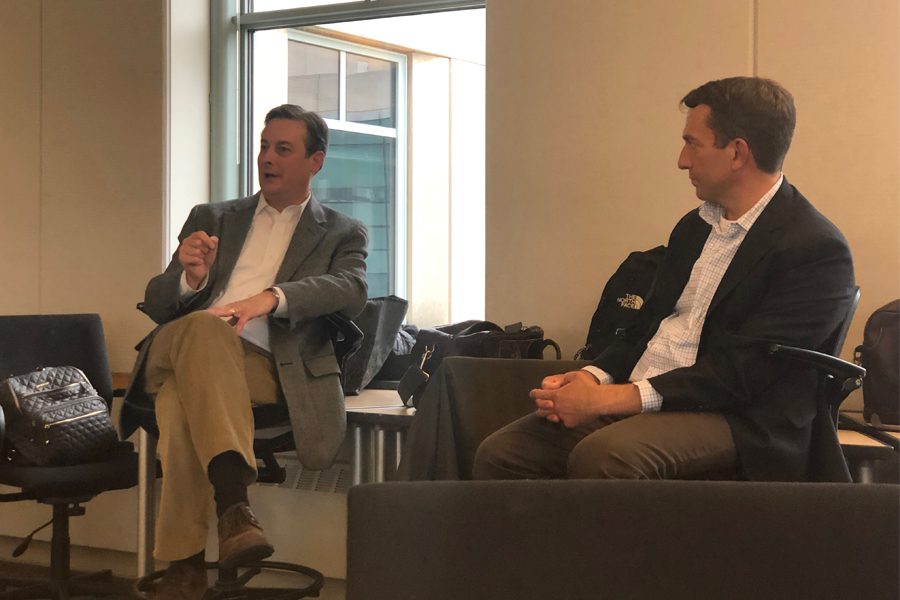Former Obama campaign strategists talk 2020, mobilization of young voters
Daisy Conant/Daily Senior Staffer
Terry Walsh, left, and Jon Carson, right, talk to students about campaign strategies during the 2008 presidential election. Both men emphasized the differences between political consultants then and now.
May 22, 2019
Former President Barack Obama’s campaign and administration officials Jon Carson and Terry Walsh spoke to students and faculty about their experiences working on the 2008 Obama campaign, as well as the past and future influence of media in political campaigns.
The event, hosted Tuesday evening in Annenberg Hall, was an extension of SESP Prof. Nancy Rotering’s class on women in American political leadership. Walsh and Carson talked with Rotering’s class about ethics in political campaigns.
Rotering, who is also the mayor of Highland Park, Illinois, then opened the door for any student to come and listen to the two political veterans.
“It’s always fascinating when you can have two leading members of Barack Obama’s national campaign team come by and have a conversation with you,” Rotering said. “These guys were really major parts of that campaign, so I wanted the students of Northwestern to have the opportunity to talk with them.”
As the event began, the discussion quickly moved from the two officials speaking to them asking questions of students, focusing on the energy of young people ahead of the upcoming primary elections.
Carson, who was the national field director for Obama’s 2008 campaign and director of the White House’s Office of Public Engagement, recalled mass mobilization efforts for the 2008 election and said the future Democratic nominee will need to salvage those numbers from 2008, especially among college students.
“The response from college students in particular was utterly amazing,” Carson said. “People just left school for a semester … and we’re going to need that in 2020.”
Walsh, a former campaign adviser, said he believes it is too early to make predictions for the Democratic primary field. None of the current candidates, Walsh believes, are “finished products.”
Candidates change over the course of the cycle, both strategists said. These early days of the race work as a way for candidates to experience areas of the nation that may be unfamiliar.
“One of the advantages is you get a lot of people who are maybe metropolitan type candidates who (are) exposed to rural voters in many cases for the first time,” Walsh said of the Iowa caucuses. “Because as much as you might have the best intentions about different parts of the country, you may have never seen it first-hand or have stories of people (who) are living in that environment.”
Walsh and Carson also discussed the ways in which technology has played an increasing role for campaigns and even political consultants themselves.
Walsh came from a time that kept consultants behind the scenes. In many instances, staffers did not even have a Twitter handle.
“It’s one thing to go on to Sunday news programs — that’s part of your job,” Walsh said. “But now, you have this running dialogue on the side that is different.”
At the end of the event, students enjoyed the guests’ input on the state of politics, and it helped one as he contemplated running for office.
Andre Earls, a Medill graduate student, is considering a run for state representative in Connecticut. Events like these, he said, help him gain knowledge of strategy from experienced operatives.
“We got to really discuss political strategy with two guys that worked for the Obama administration and are extremely qualified in what they do,” Earls said. “It definitely was impactful.”
Email: zamoneperez2022@u.northwestern.edu
Twitter: @zamoneperez



